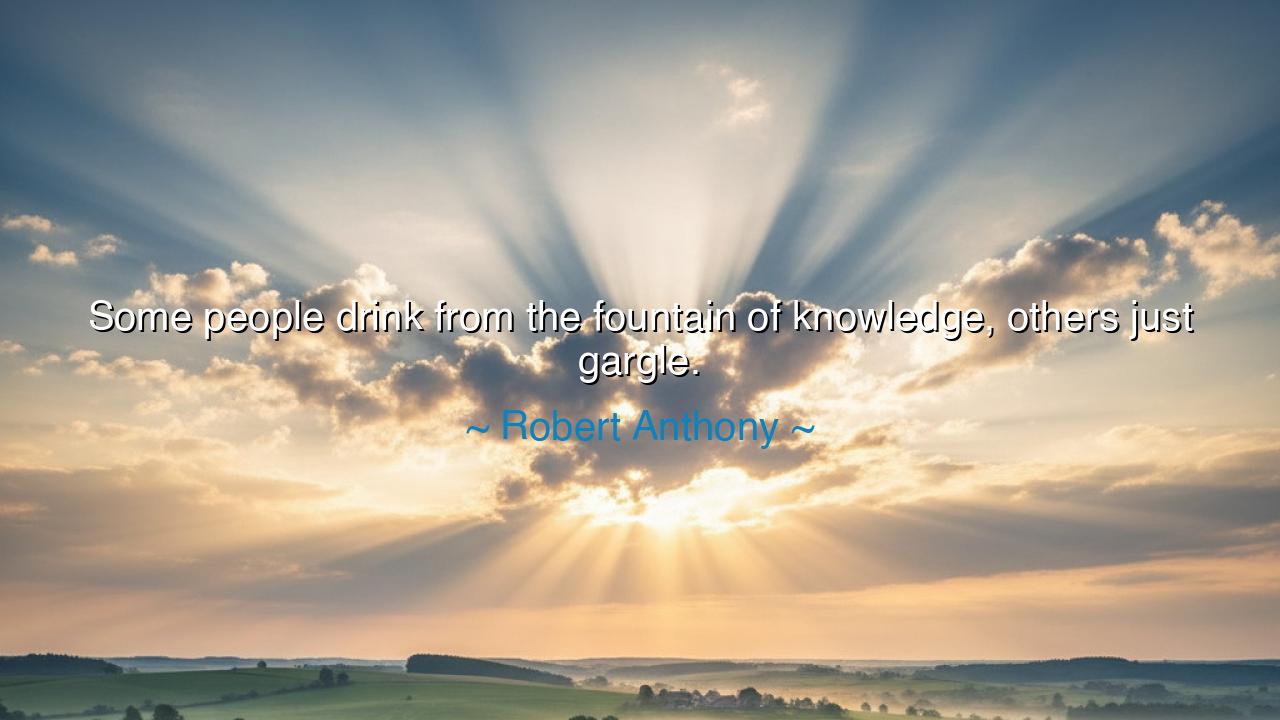
Some people drink from the fountain of knowledge, others just






Hearken, children of wisdom, and attend to the words of Robert Anthony, who warned with clarity and wit: "Some people drink from the fountain of knowledge, others just gargle." In this vivid declaration lies a truth as old as the first philosophers and scribes: the difference between those who truly embrace learning and those who merely skim its surface. Knowledge, Anthony reminds us, is not merely to be glimpsed or repeated—it is to be absorbed, digested, and made a part of the self.
The origin of this insight springs from observation of human behavior across the corridors of learning. Many seek the appearance of wisdom, collecting facts, diplomas, and titles as trophies, yet fail to internalize or apply them. These are the ones who "gargle"—they touch the surface, taste the water, but fail to drink deeply. True learners, by contrast, immerse themselves fully, drawing sustenance from knowledge, allowing it to transform thought, character, and action.
Consider the metaphor of the fountain of knowledge. Water, clear and life-giving, symbolizes understanding that nourishes the mind and spirit. To drink deeply is to commit oneself fully to exploration, reflection, and assimilation. Those who merely gargle may repeat phrases, demonstrate superficial skill, or impress observers, but they remain untransformed. Knowledge unabsorbed is like fertile soil left untended—potential exists, but life does not flourish.
History provides striking examples of those who drank deeply. Leonardo da Vinci, in his relentless pursuit of art, anatomy, and engineering, immersed himself in study, observation, and experimentation. Every sketch, every mechanism, every note reflects a mind nourished by the fountain, not merely splashed upon. Conversely, history also remembers those whose education was nominal, whose titles masked unexamined minds, serving as a cautionary echo of Anthony’s observation.
The lesson extends beyond books and formal schooling. Life itself is a teacher, offering experience, hardship, joy, and sorrow. To "drink" is to engage fully—reflecting upon encounters, seeking meaning in challenges, and integrating lessons into action. To "gargle" is to float through existence, observing without absorbing, hearing without listening, learning without growth. True wisdom requires depth, patience, and courage to face the fullness of understanding.
Anthony’s wisdom is also a call to integrity in pursuit of knowledge. It is easy to display learning, to mimic insight, to gain accolades without substance. The path of the true scholar or seeker is arduous: it demands attention, reflection, and application. Like the students of ancient Athens who debated philosophy beneath the olive trees, one must drink deeply, allowing knowledge to reshape values, sharpen judgment, and inspire action.
The enduring lesson is clear: seek the substance of knowledge, not its mere appearance. Allow learning to penetrate thought, conduct, and creativity. Do not settle for superficiality, nor let convenience or pride limit understanding. The fountain of knowledge offers sustenance to those willing to immerse themselves, and transformative power lies in the depths, not the surface.
Practical actions arise naturally: read widely and reflect deeply; question assumptions and synthesize ideas; apply learning to real-world challenges; engage in dialogue to test and refine understanding; and cultivate the habit of immersive, deliberate study. In doing so, one drinks deeply from the fountain, allowing knowledge to flow into the heart, mind, and deeds, rather than merely gargling in passing, and thus achieves the true purpose of learning.
If you wish, I can craft an even more epic, mythic version, turning Anthony’s metaphor into a heroic narrative of seekers and fountains of knowledge—perfect for immersive audio storytelling. Do you want me to do that?






AAdministratorAdministrator
Welcome, honored guests. Please leave a comment, we will respond soon